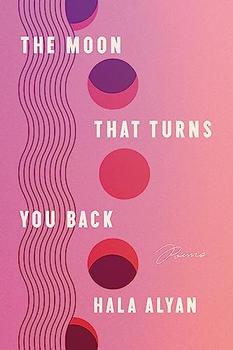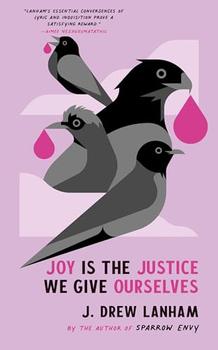Summary | Excerpt | Reviews | Beyond the book | Read-Alikes | Genres & Themes | Author Bio

Poems
by Hala AlyanThe poignant, accessible poems in Palestinian American author Hala Alyan's fifth collection, The Moon That Turns You Back, emerge from a family history of Arab diaspora. Simultaneously tied to and cast out from various war-torn nations of the Middle East, generations of her family have been exiles. The poet describes her father as "unreturnable / one passport short of country / one country short of citizen."
Displacement and migration lead to a sense of being caught between nations, especially wrenching for Palestinians, whose homeland has been under Israeli occupation since 1967: "my country is a ghost," Alyan writes. In "When they Say Pledge Allegiance, I Say," she gives a potted history of Palestine from its creation in 1948 to its ongoing existence as stolen land. One of her frequent rhetorical techniques is anaphora (repetition of the same phrase at the start of multiple lines), in this case zeroing in on key moments from Palestinian history in each stanza through "my country is" or "it is [year]" openings. She also repeats "I mean" to elicit nuances or document contradictory responses: "it is 1990 // mother is crossing a border I mean desert I mean life … it is 2003 and I am in Beirut watching Baghdad burn because of America // I mean I am in my country // watching my country burn because of my // country."
Alyan conveys her longing for individual relatives as well as for the motherland. "They Both Die on Mondays in April" is an elegy for ancestors Fatima and Nadia. She affirms their continuing role in her life via flashbacks to their experiences, dreams about them, and the fact that she feels, "I'm forever living between Aprils." She also expresses grief for the unfulfilled ambition of motherhood. Infertility is a recurring subject, with mentions of ectopic pregnancy and miscarriages. Lunar metaphors link heavenly bodies and bodily cycles. In "The Uterus Speaks," one of several poems with medical vocabulary, a wry tone lightens the sadness of failure to conceive: "two million eggs I burn like Vegas money. / I tried, I tried."
The focus is very much on the physical, with the imagery drawing on everyday things such as food, flowers, and household objects. However, Alyan makes the familiar fresh through surprising similes: "the days noosed me like a turtleneck"; "When the warplanes come, I pluck them / from the blue sky like Tic Tacs." Items that don't appear noteworthy take on significance in context, whether as heirlooms ("we left that tablecloth / damask named after Damascus") or as embodiments of memory ("I reek of nostalgia: for balconies with rubber plants and ecstasy trips, backseats, / cold showers, Halloween in a shredded dress").
The poet captures the uncertainty and flux of existence for expatriates, refugees, and others dealing with conflict or its aftermath. She also contrasts acceptance of the shape of one's life with the desire to change it – particularly, in her case, the yearning for a baby. Four "Interactive Fiction" poems, formatted as three-column tables, explore the idea of various possible routes; a sort of "Choose Your Own Adventure."
Overall, Alyan's verse is casual and inviting. Readers new to poetry need not be wary; the book is led by its themes and features recognizable characters and events. A family memoir can be pieced together along the way, but the emotional territory is universal: health struggles, bereavement, homesickness, and coping with the tragic and unexpected.
![]() This review
first ran in the May 1, 2024
issue of BookBrowse Recommends.
This review
first ran in the May 1, 2024
issue of BookBrowse Recommends.

If you liked The Moon That Turns You Back, try these:

One Day, Everyone Will Have Always Been Against This
by Omar El Akkad
Published 2025
From award-winning novelist and journalist Omar El Akkad comes a powerful reckoning with what it means to live in a West that betrays its fundamental values.

Joy Is the Justice We Give Ourselves
by J Drew Lanham
Published 2024
From J. Drew Lanham, MacArthur "Genius" Grant recipient and author of Sparrow Envy: A Field Guide to Birds and Lesser Beasts, comes a sensuous new collection in his signature mix of poetry and prose.
Your guide toexceptional books
BookBrowse seeks out and recommends the best in contemporary fiction and nonfiction—books that not only engage and entertain but also deepen our understanding of ourselves and the world around us.